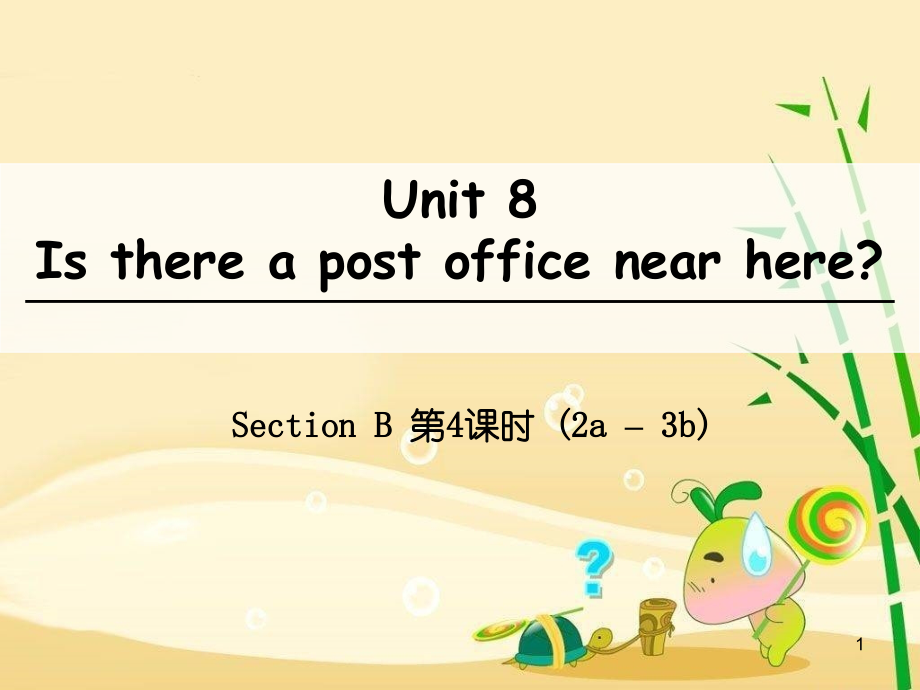《七年級(jí)英語(yǔ)下冊(cè) Unit 8 Is there a post office near here(第4課時(shí))Section B(2a-3b)課件 (新版)人教新目標(biāo)版》由會(huì)員分享����,可在線閱讀����,更多相關(guān)《七年級(jí)英語(yǔ)下冊(cè) Unit 8 Is there a post office near here(第4課時(shí))Section B(2a-3b)課件 (新版)人教新目標(biāo)版(21頁(yè)珍藏版)》請(qǐng)?jiān)谘b配圖網(wǎng)上搜索。
1���、Section Section B B 第第4 4課時(shí)課時(shí)(2 2a a 3b3b)Unit 8 Is there a post office near here?1 Zhongshan Road2根據(jù)上一幅簡(jiǎn)要地圖���,介紹一下自己根據(jù)上一幅簡(jiǎn)要地圖,介紹一下自己所在社區(qū)的位置及建筑���。所在社區(qū)的位置及建筑����。I live in a quiet neighborhood,there is a library near there,I ofthen read books in the library with my parents.There are many people reading books
2���、 on weekends.The library is very next to a bank.To get to the library,I walk along Zhongshan Road,its on the right.3Check()the places near your home.Tell your partner where they are.2aclothes store post officebookstore schoolsupermarket bank4Read the passages.Match each passage with a map.2b Anna Jo
3��、hn Lisa51.What does Anna like doing in the zoo?2.Does Anna think monkeys are like people?Why?She loves to watch the monkeysclimbing around.Yes,she does.Because think that monkeys look like her friends and her when they fight.2c.Read the passages again and answer the questions.63.What does John like
4�����、to do at the park?4.John thinks the best things do not need money.Do you think so,too?5.How does Lisa get to the library from her home?He likes exercising at the park.Yes,I do.She just goes down North Road and turns left.It is across from the park.7Read the passages carufully.If you are the author,h
5��、ow can you describe where your home is and how you can get somewhere?8My house is across from a _ on Long Street.I usually go shopping at a _ near my house.It is between a _ and the _.On weekends,I like to play in the _.To get there,I go along Long Street and turn left on North Street.It is on the r
6���、ight,next to a _.Look at the map of Cindys neighborhood and fill in the blanks.3alibrarylibrarypost officesupermarketparkhotel9Where do you live?What is your favorite place in your neighborhood?Why?How do you get there from your home?3b.Draw a map of your neighborhood and write about it.These questi
7�����、ons may help you.10寫(xiě)作指導(dǎo):寫(xiě)作指導(dǎo):典型考題回放典型考題回放 假若這個(gè)周日是你的生日�����,你準(zhǔn)備在家舉假若這個(gè)周日是你的生日���,你準(zhǔn)備在家舉辦一個(gè)生日辦一個(gè)生日party。你要邀請(qǐng)��。你要邀請(qǐng)Susan����,可她不����,可她不知道去你家的路�。你家住在布里奇街,乘坐六知道去你家的路�。你家住在布里奇街,乘坐六路公共汽車(chē)在布里奇街站下車(chē)��,下車(chē)后沿著街路公共汽車(chē)在布里奇街站下車(chē)���,下車(chē)后沿著街道走,然后在第一個(gè)十字路口右拐�,左邊有一道走,然后在第一個(gè)十字路口右拐�,左邊有一個(gè)郵局,你家就在郵局的對(duì)面���,房子是紅色的�����,個(gè)郵局�,你家就在郵局的對(duì)面,房子是紅色的��,很容易找到���。請(qǐng)你根據(jù)所給信息給很容易找到��。請(qǐng)
8��、你根據(jù)所給信息給Susan寫(xiě)一寫(xiě)一封封e-mail����。111.首先告訴她你的生日是什么時(shí)候��,其次可首先告訴她你的生日是什么時(shí)候���,其次可以將要用的表示以將要用的表示方位的方位的短語(yǔ)用英語(yǔ)列個(gè)簡(jiǎn)短語(yǔ)用英語(yǔ)列個(gè)簡(jiǎn)單的提綱�。單的提綱����。2.選好選好句型表達(dá)、短語(yǔ)和單詞句型表達(dá)�����、短語(yǔ)和單詞等,如:等�,如:get off“下車(chē)下車(chē)”;turn right“向右轉(zhuǎn)向右轉(zhuǎn)”�����;across from“在在.對(duì)面對(duì)面”等等�����。本篇文等等��。本篇文章根據(jù)內(nèi)容判斷全文基本時(shí)態(tài)是章根據(jù)內(nèi)容判斷全文基本時(shí)態(tài)是一般將來(lái)一般將來(lái)時(shí)時(shí)�����,但可以盡量多采用現(xiàn)在時(shí)��。��,但可以盡量多采用現(xiàn)在時(shí)����。思路點(diǎn)撥思路點(diǎn)撥:121.spend的用法的用法
9�����、spend是是動(dòng)詞動(dòng)詞,意為��,意為“度過(guò)��,花費(fèi)度過(guò)�����,花費(fèi)”(1)當(dāng)意為當(dāng)意為“度過(guò)度過(guò)”時(shí)��,后面常接時(shí)�����,后面常接時(shí)間作賓語(yǔ)時(shí)間作賓語(yǔ)����。如:如:I like to spend time there on weekends.我周末喜歡在那里度過(guò)。我周末喜歡在那里度過(guò)�。Language points13(2)當(dāng)意為當(dāng)意為“花費(fèi)花費(fèi)”時(shí),既可指時(shí)�,既可指“花費(fèi)時(shí)間花費(fèi)時(shí)間”也可指也可指“花費(fèi)金錢(qián)花費(fèi)金錢(qián)”。常用結(jié)構(gòu):常用結(jié)構(gòu):spend.(in)doing sth.�,表示�,表示“花費(fèi)時(shí)間花費(fèi)時(shí)間/金錢(qián)金錢(qián)做某事做某事”����;spend.on sth.,表示��,表示“在在.上花費(fèi)時(shí)間上花費(fèi)時(shí)間/金錢(qián)金錢(qián)”�,兩
10、個(gè)結(jié)構(gòu)可互換��。兩個(gè)結(jié)構(gòu)可互換��。如:如:Mr Brown spend most of his money on books(=in buying books).布朗先生花費(fèi)了他大部分的錢(qián)買(mǎi)書(shū)布朗先生花費(fèi)了他大部分的錢(qián)買(mǎi)書(shū)��。Language points14辨析:辨析:spend,take,pay,costspend意為意為“花費(fèi)花費(fèi)”�����,主語(yǔ)是�,主語(yǔ)是人人��,花時(shí)間或花�,花時(shí)間或花金錢(qián)。金錢(qián)��。pay意為意為“花費(fèi)花費(fèi)”,主語(yǔ)是����,主語(yǔ)是人人,一般用于����,一般用于pay some money for sth.結(jié)構(gòu)中,表示在某物上花結(jié)構(gòu)中���,表示在某物上花了多少錢(qián)���。了多少錢(qián)。Language points15
11����、take意為意為“花費(fèi)花費(fèi)”,主語(yǔ)是��,主語(yǔ)是物物����,常用的,常用的句型為:句型為:it takes/took sb.some time to do sth.,意思是意思是“花費(fèi)某人多長(zhǎng)時(shí)間花費(fèi)某人多長(zhǎng)時(shí)間做某事做某事”cost意為意為“花費(fèi)花費(fèi)”����,主語(yǔ)是��,主語(yǔ)是物物�����,一��,一般表示某物花了某人多少錢(qián)���。般表示某物花了某人多少錢(qián)。Language points162.watch的用法的用法(1)作作名詞名詞��,意為�����,意為“手表手表”�。如:如:I have a beautiful watch.我有一只漂亮的手表。我有一只漂亮的手表���。(2)作作動(dòng)詞動(dòng)詞,意為�����,意為“觀看,留意����,看守,看護(hù)觀看�����,留意�����,看守����,看
12、護(hù)”���。如如:I watched TV for six hours.我看了六個(gè)小時(shí)電視����。我看了六個(gè)小時(shí)電視�����。Language points17Watch that the milk doesnt boil over.小心別讓牛奶溢出來(lái)。小心別讓牛奶溢出來(lái)����。They had her watched by detectives.他們把她置于偵探的監(jiān)視之下。他們把她置于偵探的監(jiān)視之下���。I want you to watch the child while Im away.我要你在我不在的時(shí)候看管這孩子��。我要你在我不在的時(shí)候看管這孩子��。注:注:watch常與常與over 搭配使用���,意為搭配使用,意為“小心�,看小心,看護(hù)護(hù)”��。Language points18小結(jié)訓(xùn)練小結(jié)訓(xùn)練1.We enjoy _ Jay Chous songs.A.listen to B.listening C.listening to D.listen 2.I spend two hours _ his homework every day.A.does B.do C.to do D.doingCD19完成當(dāng)堂測(cè)評(píng)作業(yè)����。完成當(dāng)堂測(cè)評(píng)作業(yè)。20 構(gòu)成我們學(xué)習(xí)最大障礙的是已知構(gòu)成我們學(xué)習(xí)最大障礙的是已知的東西,而不是未知的東西�����。的東西��,而不是未知的東西����。貝爾納貝爾納21
 七年級(jí)英語(yǔ)下冊(cè) Unit 8 Is there a post office near here(第4課時(shí))Section B(2a-3b)課件 (新版)人教新目標(biāo)版
七年級(jí)英語(yǔ)下冊(cè) Unit 8 Is there a post office near here(第4課時(shí))Section B(2a-3b)課件 (新版)人教新目標(biāo)版

